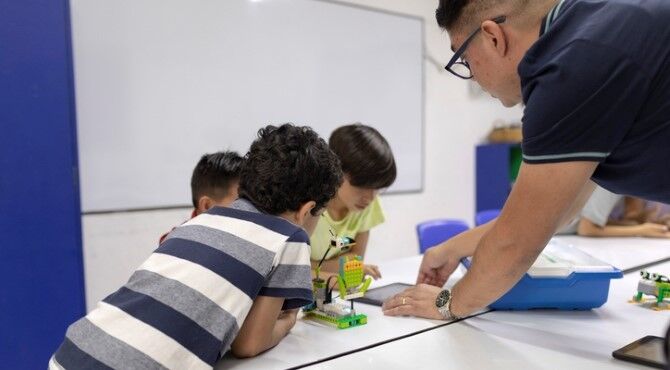New report by Cambridge identifies five priorities to prepare students for a changing world
Foster greater self-management skills to help students navigate uncertainty
Reframe subject knowledge to increase its value in age of AI
Signpost skills more clearly so students recognise they're prepared for the future
Strengthen oracy to help students build meaningful relationships
Strengthen the role of school as the place to build purposeful connections

- teachers and students view self-management skills as critical for the future, but it was selected as the skill most difficult to teach (23%) and learn (19%) from a list of options.
- technology is central to this challenge: while it supports learning, students worry about distraction and over-reliance on devices, and 88% of teachers perceive attention spans to be getting shorter.
- communication skills (including social skills and empathy) are viewed as critical for success. Students value these skills for understanding the perspectives of others and feeling included. However, 61% of teachers say fear of judgement is a challenge in helping students develop their interpersonal skills, and 25% of teachers list this as the single greatest challenge.
- Psychologically safe, inclusive classrooms are essential for developing effective communication skills. Schools should purposefully create environments where students can experiment with language, consider different ways of communication, make and learn from mistakes, and grow in confidence.
- subject knowledge is essential for progression through education but seen as less important beyond it. This suggests subject knowledge is viewed as a short-term “currency” rather than a lifelong asset.
- Fewer than half of students surveyed feel prepared for their next step in education (48%) or their future beyond it (45%). But teachers are more confident: 67% feel their students are well prepared for their next step in education, and 59% say their students are well prepared for life after education.
Read related articles
- A level and BTEC results day opening opportunities
- The Future of education: Balancing innovation, inclusivity and wellbeing
- Closing the UK’s digital skills gap
- How to teach future-readiness
International education ideally placed
With its diverse contexts and communities, international education provides fertile ground for innovation – whether in signposting skills, strengthening oracy, supporting wellbeing, or helping students navigate uncertainty. As the world’s largest provider of international education for 3-to 19-year-olds, Cambridge works with over 10,000 schools in 160 countries and partners with more than 50 governments worldwide.Rod Smith, Group Managing Director for International Education at Cambridge, said: "This research gives us a deeper understanding of how students and teachers are experiencing change. What strikes me most is the clarity with which it highlights a simple truth: never has the role of schools and teachers been more important. At a time of profound global change, great schools, great teachers and a clear, purposeful curriculum remain the foundations of great education."Next steps
Cambridge has begun turning the insights from this report into action, with initiatives underway including:- a new Skills Profile tool to help students identify and develop skills alongside subject knowledge.
- teacher resources on developing executive function skills, created in partnership with Sara Baker, Professor of Developmental Psychology and Education, Faculty of Education, University of Cambridge.
- a global Education Summit and the launch of a permanent student consultative forum to guide future work.
- an extended Wellbeing Curriculum for students aged 14 and over.
About Cambridge
The International Education group at Cambridge University Press & Assessment is part of the University of Cambridge. Our International Education group works with schools worldwide to build an education that shapes knowledge, understanding and skills. Together, we give learners the confidence they need to thrive and make a positive impact in a changing world.We offer a globally trusted and flexible framework for education from age 3 to 19 (the Cambridge Pathway), informed by research, experience, and listening to educators. With recognised qualifications (such as Cambridge IGCSE and International AS & A Level), high-quality resources, comprehensive support and valuable insights, we help schools prepare every student for the opportunities and challenges ahead. Together, we help Cambridge learners be ready for the world.To learn more, visit www.cambridgeinternational.org

Find out more about the Think Global People and Think Women community and events.

Subscribe to Relocate Extra, our monthly newsletter, to get all the latest international assignments and global mobility news.Relocate’s new Global Mobility Toolkit provides free information, practical advice and support for HR, global mobility managers and global teams operating overseas.
©2026 Re:locate magazine, published by Profile Locations, Spray Hill, Hastings Road, Lamberhurst, Kent TN3 8JB. All rights reserved. This publication (or any part thereof) may not be reproduced in any form without the prior written permission of Profile Locations. Profile Locations accepts no liability for the accuracy of the contents or any opinions expressed herein.


























